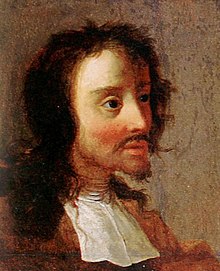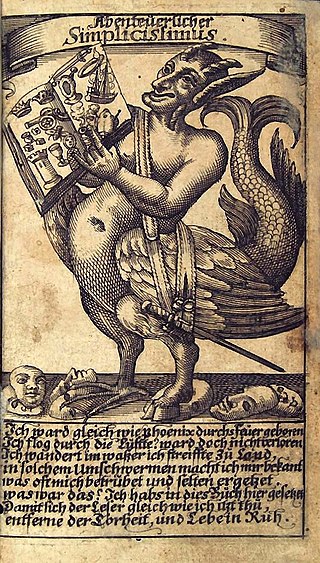Hans Jakob Christoffel von Grimmelshausen
German novelist (1621/2–1676) From Wikipedia, the free encyclopedia
Hans Jakob Christoffel von Grimmelshausen (1621/22 – 17 August 1676)[3] was one of the most notable German authors of the 17th century.[4] He is best known for his 1669 picaresque novel Simplicius Simplicissimus (German: Der abenteuerliche Simplicissimus) and the accompanying Simplician Scriptures series.
Hans Jakob Christoffel von Grimmelshausen | |
|---|---|
 1641 portrait claimed to show Grimmelshausen[2] | |
| Born | 1621 or 1622[3] Gelnhausen, County of Hanau, Holy Roman Empire |
| Died | 17 August 1676 Renchen, Margraviate of Baden, Holy Roman Empire |
| Pen name | German Schleifheim von Sulsfort; various anagrams of his name[a] |
| Occupation | Writer |
| Language | German |
| Period | Baroque-era Germany |
| Genre | Novel, Allegory, Satire |
| Literary movement | German Baroque |
| Notable works | Simplicius Simplicissimus |
| Spouse | Katharina Henninger |
Early life
Grimmelshausen was born at Gelnhausen. At the age of ten, he was kidnapped by Hessian soldiers, and in their midst experienced military life in the Thirty Years' War. In 1639, he became a regular soldier in the Imperial Army. At the latest, in the year 1644 he worked as a writer in a regiment's chancellery—from that year on documents by Hans Jakob Christoffel exist. At the close of the war, Grimmelshausen entered the service of Franz Egon von Fürstenberg, Catholic bishop of Strasbourg. Subsequent to the peace, Grimmelshausen converted to Catholicism,[5] although certain accounts indicate that his conversion occurred in the late 1630s. In 1665, he was made magistrate (German: Schultheiß) at Renchen in Baden. On obtaining this appointment, he devoted himself to literary pursuits.[3]
Works
Summarize
Perspective

Grimmelshausen's work is greatly influenced by previous utopian and travel literature, and the Simplicissimus series attained a readership larger than any other seventeenth-century novel. Formerly, he was credited with Der fliegende Wandersmann nach dem Mond, a translation from Jean Baudoin's L'Homme dans la Lune, itself a translation of Francis Godwin's The Man in the Moone,[6] but recent scholars have disputed this; he did, however, write an appendix to a 1667 edition of that translation, the basis for that association. Der fliegende Wandersman was included in his collected works, though without the appendix.[7]
In 1668, Grimmelshausen published Der abenteuerliche Simplicissimus,[8] which has been called the greatest German novel of the 17th century.[9] For this work he took as his model the picaresque romances of Spain, already to some extent known in Germany. Simplicissimus has been interpreted as its author's autobiography; he begins with the childhood of his hero, and describes the latter's adventures amid the stirring scenes of the Thirty Years' War. The rustic detail with which these pictures are presented makes the book a valuable document of its time. For some, however, the later parts of the book overindulge in allegory, and finally become a Robinson Crusoe story.[3]
Among Grimmelshausen's other works, are the so-called Simplicianische Schriften (German: Simplizianische Schriften):
- Die Ertzbetrügerin and Landstörtzerin Courasche[10] (1670)
- Der seltsame Springinsfeld[11] (1670)
- Das wunderbarliche Vogelnest (1672)
He also published satires, such as Der teutsche Michel[12] (1673), and gallant novels, like Dietwald und Amelinde (1670).
Death and legacy



Grimmelshausen died in Renchen in 1676, where a monument was erected to him in 1879.[3]
His Landstörtzerin Courasche became an inspiration for Bertolt Brecht's play Mother Courage and Her Children.[13][14]
Der abenteuerliche Simplicissimus lent its name to Simplicissimus, a satirical German weekly which ran from 1894 to 1944 and 1954 to 1967.
Notes
- List of pseudonyms attributed (as anagrams) to Grimmelshausen:
Samuel Greiffensohn von Hirschfeld
German Schleifheim von Sulsfort
Melchior Sternfels von Fugshaim
Philarchus Grossus von Trommenheim
Michael Rechulin von Sehmsdorf
Eric Steinfels von Grufenshohn
Simon Lengfrisch von Hartenfels
Israel Fromschmid von Hugenfels[15]
References
Further reading
External links
Wikiwand - on
Seamless Wikipedia browsing. On steroids.
